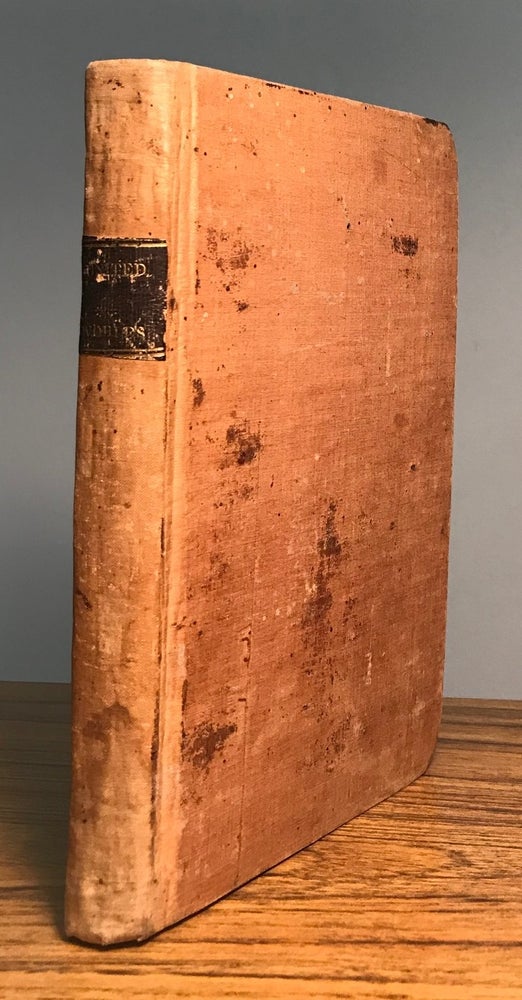THE UNITED WORLDS, A POEM, IN FIFTY SEVEN BOOKS. Hamilton, N.Y. Printed for the Proprietor, 1834. 12mo, pp. [i-iii] iv [v-vi] [7] 8-250 [251-252: blank] [note: last leaf is a blank], fly leaves at front and rear, original salmon cloth, black leather label ruled and titled in gold affixed to spine panel. First edition. "Mark Drinkwater" is the pseudonym of General Nathaniel King (1767-1848), a prominent early resident of Madison County, NY and founder and publisher of THE MADISON FARMER in 1828 (later renamed THE HAMILTON REPUBLICAN). The book is copyright 1831 by "Nathaniel King, Proprietor," perhaps indicating prior publication in a regional newspaper. Incredible early American science fiction narrative poem concerning the discovery of an inhabited interior world and the ultimate union between that nation and the nations on the earth's surface, set squarely within the tradition of late eighteenth and early nineteenth century American eutopian visions in verse by Timothy Dwight, Joel Barlow and others, clearly influenced by the hollow earth theory of John Cleves Symmes (discussed at length in the text) and Captain Adam Seaborn's fictional SYMZONIA (1820) whose denizens of the interior world closely resemble Drinkwater's "Subterraneans," and anticipating in many particulars David A. Moore's THE AGE OF PROGRESS (1856), the latter perhaps the culmination of the early American millennial eutopian tradition. The time frame of Drinkwater's narrative is early summer 1820, the year an American exploring expedition enters the warm North Polar sea via Baffin's Bay and follows the Subterranean's fleet of silver ships into the earth's interior, and the end of the nineteenth century. The Subterraneans are descendants of Noah and prior to the appearance of the American ship, have had no contact with the exterior world, having only just managed to engineer a system to raise their ships from the earth's interior to the surface of the globe. The Subterraneans are intellectually, morally and physically superior to their counterparts inhabiting the earth's surface; a noble race, kindly, pacifistic, and without sin. The six concentric spheres within the earth, called "Orbs" by the inhabitants, have been explored, connected (by spiral roads and bridges) and settled by the Subterraneans whose population is estimated at tens of millions. The interior world is a democratic republic governed by elected representatives from each Orb. The principal pursuits of the Subterraneans are philosophy and engineering, the latter based on steam technology and hydrodynamics. Tunnels, canals and roadways have been constructed by "Androides," monstrous engines "in the form of man." The Subterraneans have balloons, gliders and steam-powered cars and ships. The American vessel accompanies the Subterranean fleet, traveling by canal to an inland sea upon whose shore stands a mammoth golden city, the seat of government of the interior world (the "Golden City" is situated directly beneath the very boots of the residents of New York City, the seat of American financial and political corruption). The ministry of the narrator converts the Subterraneans to Christianity and their Council elects to bring enlightenment and reform to the earth's exterior nations. Subterranean envoys travel to Washington and forge a treaty and alliance between the interior world and the United States. The Subterraneans construct two tunnels to the earth's surface, "one in the old world (Palestine) and one in the new (Pennsylvania)." The monarchies and despotic governments of the earth's exterior do not embrace the idea of a new republican world order. War breaks out in Europe followed by armistice and alliance of European nations against the United States and the Subterraneans who are isolationist and don't wish to fight. This stance, perceived as weakness, emboldens the European nations, soon joined by others including China, to organize an army, a million strong, to invade the interior world (considered a "second, vast Peru"), enslave the population, and plunder their riches. The force assembled against the Subterraneans is evil and in league with Satan. God sends an angel to observe what might become Armageddon. The Suterraneans muster a volunteer army of ten million. The troops are sheathed in body armor and armed with padded staffs "to prostrate squadrons with no bruise nor blood." The invaders parachute troops and ordinance into the Palestine tunnel. Half a million Subterraneans are killed, but the invaders are ultimately overwhelmed and disarmed by the interior world's superior numbers. Simultaneously the European alliance mounts an invasion of the United States, but before much fighting occurs, the huge invasion fleet is displaced by a hurricane (this appears to be divine intervention). The defeated, exhausted and dispirited enemy troops ultimately yield to the impulse of universal brotherly love, leaving the world's despots no cannon-fodder. The despots fight among themselves until all are killed or commit suicide. Delegates from all nations and regions convene in the Golden City and adopt a constitution for the United Worlds. Drinkwater's interior world is a progressive secular utopia where man has made a better world for himself by controlling his own economic, political, and physical environment. The Subterranean example inspires the United States to sweep away its rampant political, social and economic corruption (Drinkwater was anti-Jackson, anti-slavery). See Joel Nydahl, "Early Fictional Futures: Utopia, 1798-1864" in Kenneth M. Roemer (ed), America as Utopia (1981), especially pages 285-87 for a summary of American utopian themes of this period. Harris Collection of American Poetry, p. 81. American Imprints 24220 (locating three copies: DLC, MH, RNR). Not in Sabin. This extraordinary work appears to be unknown to students of science fiction and utopian literature. Cloth sunned and a bit soiled and stained, scattered foxing and staining throughout, a good, sound copy of a rare book. (#100414). Enclosed in a custom quarter leather clamshell box. (#158877).
Price: $8,500.00
No statement of printing.


